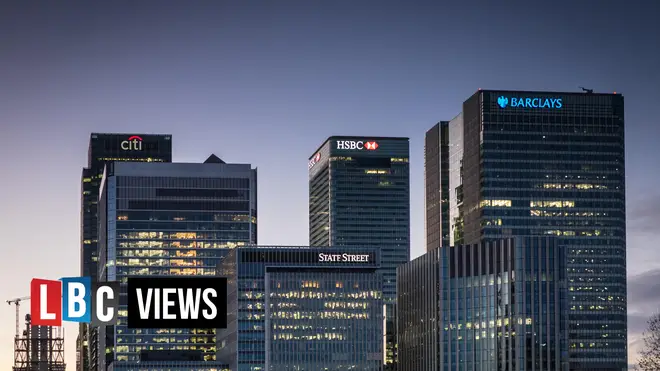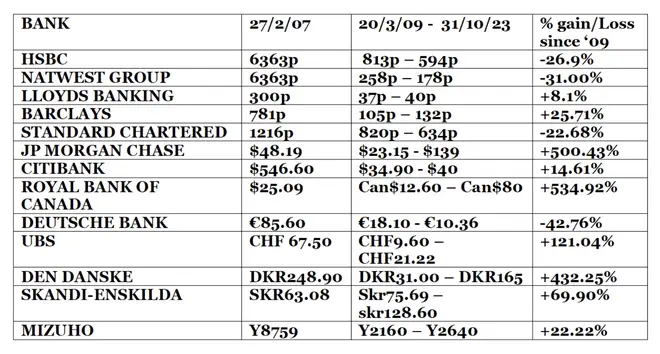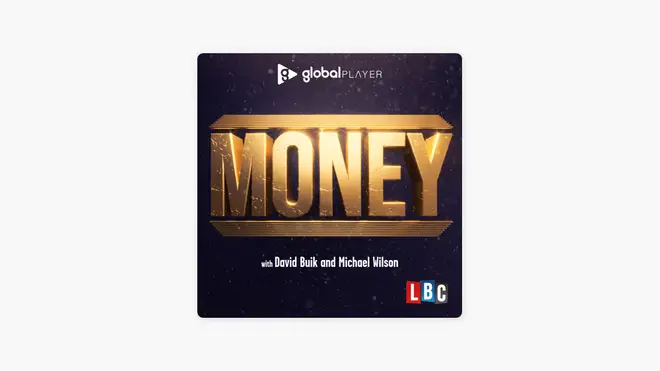
Clive Bull 1am - 4am
1 November 2023, 10:28

Few would argue that the banking and credit crisis of 2008/9, flagged up by ‘Household’, HSBC’S sub-prime lender in 2007 was the greatest economic tragedy since the ‘Depression’ in 1929. Most are of the opinion that the world’s economy has yet to fully recover.
More to the point, though banks are far better regulated in terms of increased levels of capital, there are still patches of vulnerability, existentially exposed last Spring by the extraordinary aberrations that manifested themselves at Credit Suisse and Silicon Valley Bank and Signature Bank.
As can be seen from the chart above, bank balance sheets were larupped in 2009. The share prices against some banks, posted above, are misleading. Why? Many of you may recall that the likes of NatWest (RBS), Lloyds Banking, Deutsche Bank and UBS had copious rights issues, which of course watered down their value.
However, the data shows that bank balance sheets were decimated. The recovery process has at best in places, been laboured. In terms of UK banks, the only bank to have added value since the start of this year is HSBC – up 13%. HSBC, of course makes 70% of its money in China and Asia. The rest are moderately ‘under water!’

On 19th March UBS bailed out Credit Suisse for CHF3 billion and all deposits from SVB were taken on by First Citizens Bank, with its UK operation being swept up by HSBC for £1 in a deal which 'protected customers and taxpayers' The bank used by tech companies and start-ups had a balance sheet worth £8.8billion yet was bought by Europe's largest bank for a symbolic £1. Tough regulation is essential.

However, there is no doubt that the policing of Credit Suisse’s banking decisions in terms of the collapse of the U.S. family investment fund Archegos Capital and British finance firm Greensill Capital triggered a pretax loss of close to $1 billion. Management control fell short of the standard required.
As for SVB in California, why this bank should back up the truck with low yielding bonds for liquidity purposes, will always remain a mystery, especially as the world and his wife knew interest rates were heading north to fight inflation. This was straightforward incompetence.
The gargantuan size of global debt is probably the greatest threat to growth and economic progress. The total global debt recorded in the month of October 2023 is $307 trillion. In 2020 it was $226 trillion; that’s an increase of 26% in three years – largely down to the cost of the pandemic.
The world surely cannot sustain increases, especially as the world is now burdened with commercial rates of interest and with that burden comes the responsibility of servicing that debt.

For the time being the general robustness of the US economy has for the time being allowed US sovereign debt to reach $33 trillion, but for how long. The yield on 10-year Treasury bills reached 4.91% - the highest level for 16 years.
The third quarter bank earning season has just been completed. US Banks fared reasonably well thanks to much higher interest rates. Going forward contingencies and impairment charges for bad debts will need to be closely monitored.
The top US investment banks have not performed to their usual high standard, due to a lack of deals in M&A markets. Goldman Sachs’s and Morgan Stanley’s shares are down 12% and 17 % year to date. On the whole US banks have performed better than their UK peers.
US banks tend to have more ‘arrows to their bows’ from which to earn, in terms of trading and investment management. A continued dose of neurosis continues over the financial strength of the many US regional banks.
That is unsurprising in the wake of the demise of SVB and Signature Bank in March of this year.
Last week Barclays and NatWest saw their share prices under siege for differing reasons though the controversial issues over the alleged credibility of their respective CEOS, Jess Staley and Dame Alison Rose, both of whom have departed, came under scrutiny and investors were underwhelmed.
NatWest’s shares eased by 15% and Barclays by 10% respectively on the week. There were, in fairness other contributory factors, such as a fall in profits and lower margins for lending. Standard Chartered Banks suffered at the hands of the Chinese property market. The contingencies imposed saw investors vent their spleens, in taking the shares down by 13% last week.
It is important to note that in the year to June 2023 HSBC, Barclays, Lloyds and NatWest have seen their deposits fall by £78 billion, as retail and corporate customers look for better interest rates, with households grappling with higher costs and mortgage holders looking to pay off loans early.
Retail depositors have also become more ‘savvy’ than perhaps they were three years ago. Hence the depositor now gets a better bang for its buck, which in the same breath puts strain on banking margins when lending.
The sector is well regulated now, but as our splendid old PM Harold MacMillan once said – “Events, dear boy, events!” Circumspection will be a pre-requisite.